Vice President Francia Márquez assured dozens of attendees in the auditorium of the Universidad Libre del Sur in Cali that she had remained silent for too long and that the time had come to speak.
And she did so during the opening of the meeting"Together for the Restoration of Our Dignity," held on July 25, to commemorate the International Day of Women and Girls of African Descent.
"A few years ago, I was the voice that echoed across the country, the face of hope. The Afro-descendant woman who brought the echo of the rivers, of humble homes, of popular knowledge, of calloused hands, of women who clean other people's houses while dreaming of a dignified life. But I soon went from being a political phenomenon, a heroine, to being a 'traitor,'" the vice president affirmed.
"They want us in the photo, but not in the decision-making. They want us as a symbol, but not as a people with a voice. They want us obedient. And if we don't obey, then comes the punishment: political violence, cancellation, and public dehumanization," he asserted.
This July 25th commemorates the first meeting of Latin American and Caribbean Afro-descendant women, held on July 25, 1992, in the Dominican Republic. This meeting marked a starting point for the struggle for the vindication and visibility of women of African descent and all their cultural and social contributions to the formation of states. This meeting marked the beginning of a change and the structural transformation of racial discrimination and the acts of violence, sexism, exclusion, poverty, and migration against them.
Little by little, the audience fell silent after receiving her with applause when she took the stage.
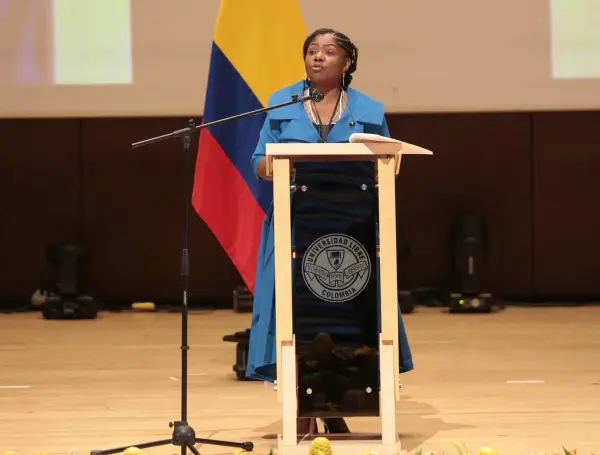
'I speak from the celebrated, worn-out, and discarded body of a Black woman.'
"Today I'm not here to talk just about myself. I'm here to speak from an Afro-descendant body, a Black woman's body that has been celebrated, exploited, worn out, and discarded. Because yes, this story began with a celebration. The day we won the second round was a day we were allowed to be present, but we weren't acknowledged," she stated.
"A few years ago, I was the voice that traveled across the country, the face of hope. The Afro-descendant woman who brought the echo of the rivers, of humble homes, of popular knowledge, of calloused hands, of women who clean other people's homes while dreaming of a dignified life," she noted.
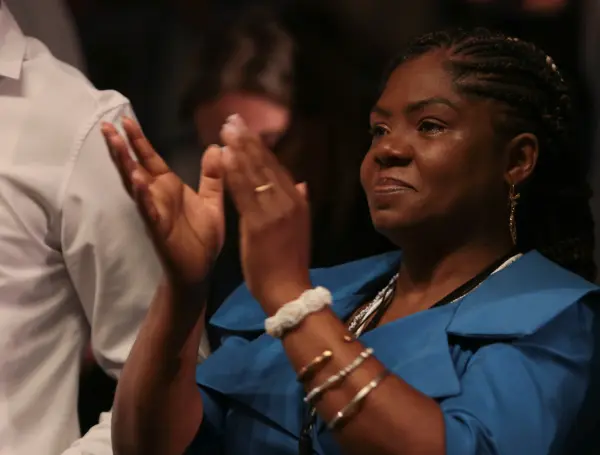
"But I soon went from being a political phenomenon, a heroine, to being a 'traitor,'" she said in the auditorium of the Universidad Libre, Valle del Lili campus, in southern Cali.
She also noted:"Because in this country, when a Black woman rises, suspicion follows her. The system doesn't question her abilities, but whether she's in the place she deserves. If she steps outside the allotted margin, then she's 'arrogant,' 'disloyal,' 'clumsy,' 'incapable,' and 'dangerous.'"
He also maintained: "We are seeing Afro-descendant leaders participating in the dynamics of power, in governments that call themselves progressive, but that still bear the hallmarks of a racial state.
As James Baldwin said, not everything that is faced can be changed, but nothing can change until it is faced. And that's what we're doing today: facing it.
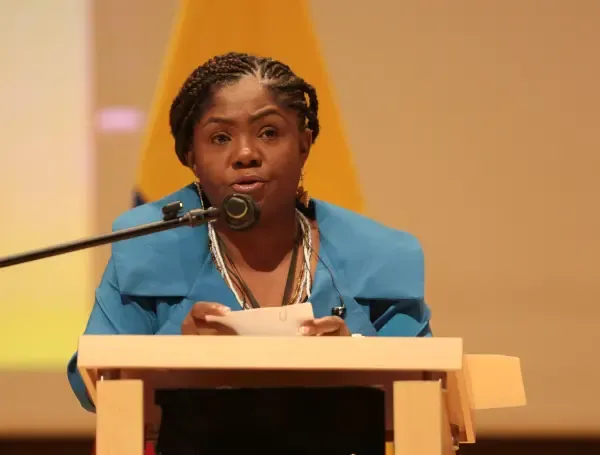
'I feel like screaming'
"I want to be clear: I'm not here to stay silent. I'm not going to pretend it doesn't hurt, that it doesn't tire, that it doesn't wear me down. I want to scream, I want to tell you how this country drags us into its narratives of exclusion, suffocates us with its mistrust, and then blames us for not breathing. How do you eliminate a Black woman from power in a contemporary democracy? With narratives that serve as a prelude to explosives or bullets. Narratives that repeat: clumsy, incapable, untrustworthy," disloyal, traitor create the perfect ground for someone to believe that eliminating us is a sign of national well-being."
She spoke about the consequences of cultivating racial hatred against those who, according to a senior state official, dare to occupy these spaces.
"I want to mention two cases that were known throughout the country, in which some people ended up facing justice for having allowed themselves to be blinded by hatred. A hatred cultivated by others who, with petty interests and from political platforms, sowed racist expressions against me and against all Black people in this country," he said.
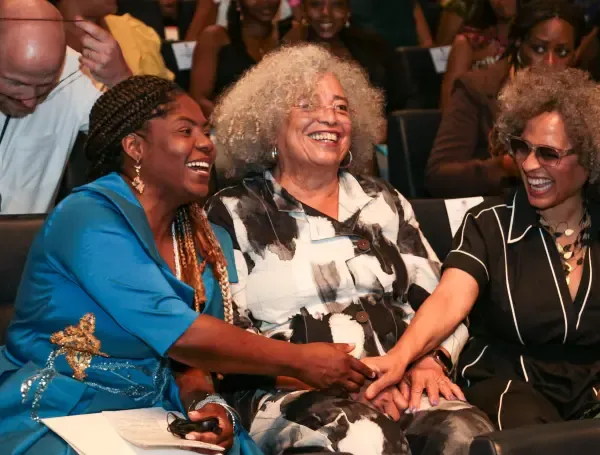
"The country has yet to forget when an elderly woman, who in Bogotá and from the Plaza de Bolívar, encouraged by the harangues that politicians were making in the middle of a march against the Government, ended up denying the human condition of black people and equated us with an animal, while shouting that it was inconceivable that a black woman could be part of the government. Of course that is racism and of course racism is a crime, so much so that a Judge of the Republic decided so and convicted her of harassment and acts of discrimination," she continued with her speech.
She added:"This was a symbolic but powerful sentence because of the message it left: Hating because of skin color is not an opinion, it's a crime! We also remember the case of a young man, paradoxically a victim of violence in this country, who, intoxicated by the hatred that was distilled on social networks, ended up wishing that a bomb would be placed at the headquarters of the Vice Presidency and thus end my life. That rage did not belong to him, it was the rage of those who sought to erase from the political spectrum a black woman who, for them, did not deserve to be using the tools that the State has at its disposal to protect its officials. It is valuable to remember this case, because the threat shows us how racism and discrimination make those who practice it believe that we do not deserve either dignity or life."
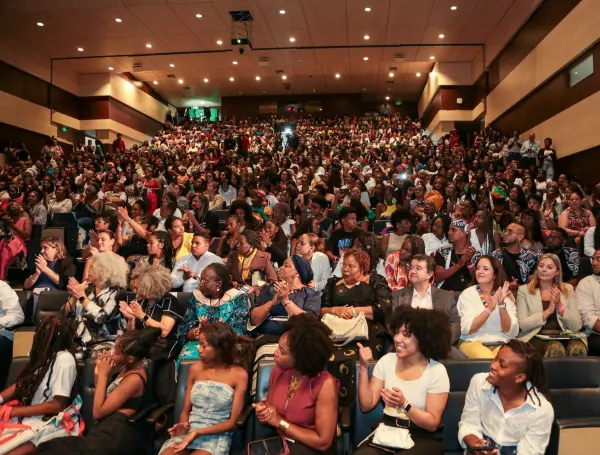
She also stated: "From the campaign until today, I have experienced many episodes of delegitimization, sabotage, and exclusion. I'll tell you just a few: I was given the mission of creating an institution without structure, without resources, without support. They told me: 'Do it yourself.' And when I argued that three deputy ministries were too many, they demanded five. I did it, despite the systematic blockade. They accused me of not executing, when they never gave me the instrument to do so. The idea was promoted that because I am black, I am sure to steal. Without having touched a peso, they treated me like a criminal, because the color of my skin, sadly, for many, makes me guilty."
'I was asked to be submissive, I demanded respect, and I was called arrogant.'
"They demanded that I be submissive. When I demanded respect, they called me arrogant. Little by little, what was said to me in private is becoming public. Now that I am cautious, I am accused of complicity for keeping silent," she added."This is not just personal. This is structural," she told attendees in the Unilibre auditorium on the stage of the meeting "Together for the Restoration of Our Dignity," leaders from cities across the country and countries around the world, where the cry for freedom and restoration for communities and, above all, for Afro-descendant women and girls was raised.
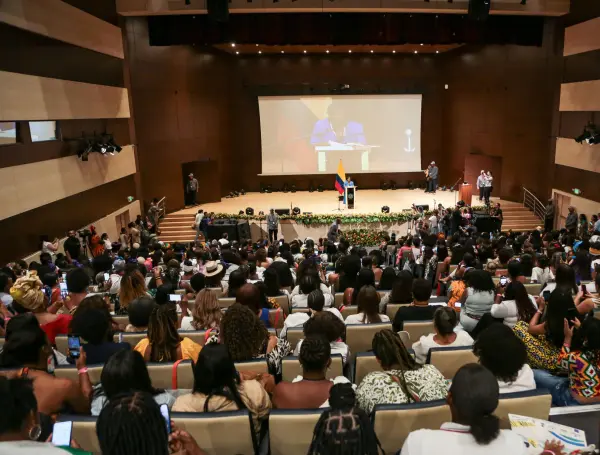
"The narrative that justified slavery, the one that said African people were not human but beasts of burden, has not disappeared. It has only mutated. Today it manifests itself in arguments that indicate what a person of African descent can or cannot say. Today, the burden is symbolic: we are useful for winning elections, but not for governing. Just as during the Republican period, our ancestors were useful for participating, on the front lines, in the struggle for Independence, but not for obtaining their freedom and participating in the nascent Republic," Vice President Márquez asserted.
'We are wanted in the photo, but not in the decision-making process'
"They want us in the photo, but not in the decision-making process. They want us as a symbol, but not as a people with a voice. They want us obedient. And if we don't obey, then comes the punishment: political violence, erasure, and public dehumanization. Today I understand why so many people of African descent who have come to power are silenced. Not because they lack ideas and the ability to govern, but because the price of speaking is high. We are not allowed irreverence, and our mistakes are magnified. But here we are!" she said forcefully.
"I know I am not alone. We are not alone. And I thank all of you for being here today to ask ourselves what the role of Afro-descendant women is in contemporary democracies," she said, addressing the leaders and the entire audience at the"Together for the Restoration of Our Dignity" meeting."And today we respond to the world that we are here to resist, to propose, to heal, and to build new forms of power that do not repeat colonial logic," she said in her speech.
"During these years in office, we have created an institutional framework for equality: we launched the National System for the Care, Prevention, Registration, and Monitoring of Gender-Based Violence (Salvia). A strategy to protect women," said the vice president.
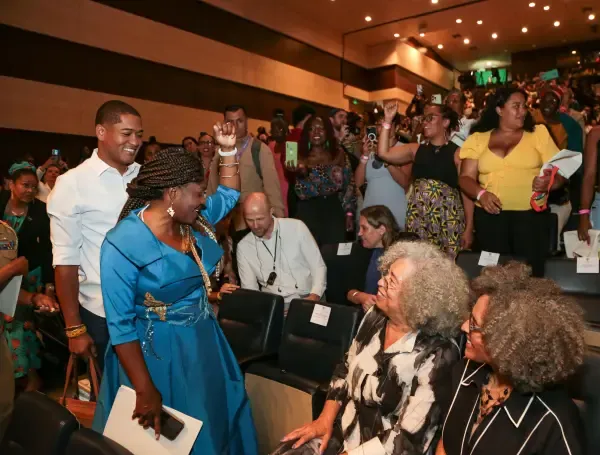
Márquez said he achieved what hadn't been possible in 30 years: advancing the regulation of Law 70 of 1993, which recognizes the rights of"Black people in Colombia."
With each word, the audience fell silent."We have already issued three decrees on natural resources, mining resources, and the expansion and sanitation of territories occupied by Black communities (decrees 1396 and 1384 of 2023, and 0129 of 2024). Today, when lives are at risk, a civilization of care is necessary. For this reason, we are moving forward in building a society that recognizes care as an essential pillar for sustaining life, through the Conpes of the National Care Policy," said Vice President Márquez.
The deputy representative of the United Nations (UN) Women in Colombia, María Inés Salamanca, recognized the work and influence of Vice President Márquez."Saying that her role has been an inspiration for millions of women and girls (...) A social and environmental leader. A Vice President of the Republic who also reflects all the women who have eliminated barriers," said the high dignitary.
"You have taught us that resistance is also joy, that politics is also done with drums, with lullabies, with poetry and with living memory. You have taught us that care and dignity are political principles, that there is no complete feminism without anti-racism, and that there is no sustainable peace without justice for women of African descent. Your leadership is a transformative force in the defense of territory, culture, peace and life. You have broken silences, paved the way, built communities and sustained struggles that today allow us to move forward with greater hope and clarity," said the deputy representative of UN Women in Colombia.
In turn, the representative of the United Nations Population Fund in Colombia, Paulo Javier Lara, pointed out"the need for specific actions to address racial and gender discrimination, ensuring that women and girls can fully participate in aspects of civil society, where they continue to face deep socioeconomic gaps, discrimination, higher levels of poverty and gender-based violence."
But Lara expressed concern: "One in four victims of sexual violence in the Colombian conflict were Afro-descendant women, girls, and adolescents. In this regard, we want to highlight the data gap: while significant progress has been made in statistical operations over the last 25 years, driven primarily by Afro-descendant organizations and communities, there remains a lack of disaggregated and timely information."
The director of the Organization of Ibero-American States (OEI) in Colombia, Donatella Montaldo, commented:"They have been given meaning when it comes to exercising rights and when there is an effective voice for these, which is also the human mandate. Making evident the defense of the human rights of Afro-descendant girls and women also contributes to the survival and revitalization of the culture and, therefore, points to attraction, the strengthening of their identity and the care of the ancestral territory."
"Now, Afro-descendant girls and women, as I have already mentioned, suffer from multiple inequalities, possibly more than other women. Let this be an opportunity to contribute, through multilateral cooperation, to closing these gaps and mitigating the barriers to accessing equal treatment, equal opportunities, the effective exercise of rights and freedoms—in any case, substantive equality," added the OEI director."Substantive equality for Afro-descendant girls and women is a commitment to social cohesion. This cohesion that creates meaning, that creates belonging, that values roots and encourages cohesion among all, promotes protection and care for each other, and elevates everyone to a maximum level of well-being," she emphasized.
"There will always be setbacks along the way, but we have to keep moving forward. And why has the level dropped a bit? Because there has been a lot of controversy, a lot of things that have been said against her (Vice President Francia Márquez), and so it is not about responding to them with their own words, but rather we have to diminish and be more intelligent, because when ignorance speaks, intelligence is silent," said Belsy Hurtado, leader of the National Roundtable of Afro Women in the municipality of Zarzal, in the north of Valle del Cauca.
The Bojayá singers were present at the meeting, whose artistic resistance is being used. They stated that after the death of some 80 people when the FARC launched a cylinder bomb in this region of Chocó during clashes with paramilitaries on May 2, 2002, the war situation has not changed significantly. The communities continue to show resilience."It's singing for resistance, spreading the word about what's happening to us in our territory."
The first meeting of Afro-descendant leaders and advocates was in 1992.
A date that has as its precedent the first meeting of Black Latin American and Caribbean women in the Dominican Republic was July 25, 1992. That day marked a starting point for the struggle for the vindication and visibility of Afro-descendant women and all their cultural and social contributions to the formation of states. It signified the beginning of a change and the structural transformation of racial discrimination and the acts of violence, sexism, exclusion, poverty, and migration against them.
Therefore, the resolution approved by the UN constitutes a historic milestone in the recognition of these rights and the contributions of Afro-descendant women in the international human rights system. It represents a first step in building a strategic platform to consolidate monitoring, coordination, and advocacy mechanisms that advance public policies and multilateral commitments with an ethnic-racial and gender perspective.
Thirty-three years after that first meeting, the gathering at the Universidad Libre in Cali was marked by music and theater, but with the strong voice of an audience of female leaders repeating:"Cimarronas, libres!".
CAROLINA BOHÓRQUEZ
Correspondent for EL TIEMPO
Cali


